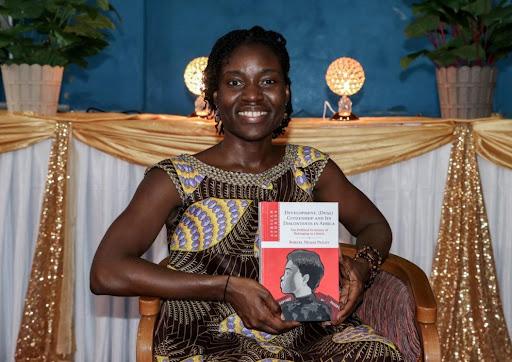Liberian Scholar Wins Best Book Award

Dr. Robtel Neajai Pailey displays her book after the inaugural launch in Monrovia on January 7, 2021.
.... “I was thrilled when my monograph was announced earlier this year as the APCG Best Book 2022,” said the Assistant Professor in International Social and Public Policy at the London School of Economics and Political Science (LSE).
Dr. Robtel Neajai Pailey, a Liberian scholar-activist, has won the 2022 African Politics Conference Group (APCG) Best Book Award for her monograph Development, (Dual) Citizenship and Its Discontents in Africa: The Political Economy of Belonging to Liberia.
This year, the APCG Selection Committee unanimously agreed that Pailey's monograph deserved the Best Book Award, said Dr. Sebastian Elischer, Associate Professor of Political Science at the University of Florida.
The APCG, a subsection of the American Political Science Association (APSA), typically issues a public call on social media and other channels asking all major academic publishing houses to nominate books for the annual Award.
According to Elischer, Chair of the 2022 Selection Committee, “a committee of academics evaluates all nominations based on 5-7 criteria and thus identifies the best book. The award is highly competitive.”
“I was thrilled when my monograph was announced earlier this year as the APCG Best Book 2022,” said the Assistant Professor in International Social and Public Policy at the London School of Economics and Political Science (LSE). "I studied African history and politics at the undergraduate and postgraduate levels, so have always kept my finger on the pulse of political economy developments in Africa. The APCG Best Book Award is a welcome recognition of my scholarly and policy work to date.”
Published in 2021 by Cambridge University Press, Development, (Dual) Citizenship and Its Discontents in Africa illustrates the promises and pitfalls of legislating dual citizenship in Liberia. Pailey draws on the life histories of more than 200 Liberians based in West Africa, Europe and North America to show that as Liberia changed from a country of immigration to one of emigration, so too did the nature of citizenship, “thus influencing arguments for and against dual citizenship.”
She also demonstrates how historical policy changes on citizenship and contemporary public discourse on dual citizenship have affected development policy and practice in Liberia.
Her monograph has impacted policymaking in her homeland. For example, she was invited on December 14, 2021 to present the findings and policy recommendations of her book to the Liberian Senate, during which she argued that minimizing inequalities would allay domestic Liberians' anxieties since many “see dual citizenship as a zero-sum game, infringing upon their already limited access to political, economic and social rights."
During the Senate briefing, Pailey disclosed that many Liberians living abroad wish to maintain their citizenship by birth and ancestry because they have contributed to the survival of the nation both in times of war and peace.
“Liberian diasporas have been significant political, economic and social actors—sending remittances, advocating for the end of conflict, investing in profitable industries like real estate and agriculture”, she said, admitting that Liberian diasporas, through their actions, have also elicited support and rejection of dual citizenship.
As a result, Pailey advised policymakers to find a compromise between furthering Liberians’ aspirations abroad and addressing Liberians’ anxieties at home. Her two-page policy briefing and oral presentation were used by the Senate Judiciary Committee in May 2022 to revise that body’s version of a dual citizenship bill that had been forwarded by the House of Representatives for concurrence in November 2021.
In July 2022, Liberia’s Legislature passed a dual citizenship law which coincided with the country’s 175th Independence Day celebrations.
Although Pailey was disappointed that all of her revisions “were not incorporated in the Amendments to the Aliens and Nationality Law--including the recommendation that would-be dual citizens be prohibited from holding all appointed positions in security and the economy”, she was pleased to have contributed to the policymaking process.
According to the Liberian scholar-activist, “the second phase of my research involves investigating whether dual citizenship actually reproduces socio-economic inequalities in Liberia.” Development, (Dual) Citizenship and Its Discontents in Africa began as her PhD thesis, which she completed at SOAS, University of London, in 2014.
Pailey was motivated after graduation to turn the thesis into a book because, according to her, she “wanted to explore how Liberians of different ages, genders, socio-economic backgrounds, migration histories, residence and citizenship statuses conceptualize and practice citizenship and whether this has any impact on how they engage (or do not engage) in post-war development efforts.”
Every year, researchers from all over the world are brought together by the APCG, whose work and professional interests are mostly or partially focused on the study of politics in Africa.
Although Elischer cannot ascertain what the long-term consequences of the 2022 Best Book Award will be, he is certain that Pailey's monograph will be widely read by academics and policymakers alike.
Limited discounted copies of Development, (Dual) Citizenship and Its Discontents in Africa are available at the Kernel Fresh Store in Boulevard Palace Hotel, Sinkor, Monrovia.
Visit https://www.robtelneajaipailey.com/ for more information about Pailey’s scholarly work and https://www.africanpoliticsgroup.org/honors-and-awards to read more about APCG honors and awards.
